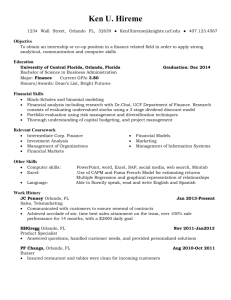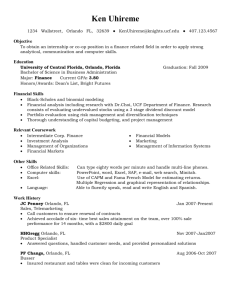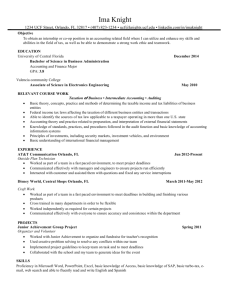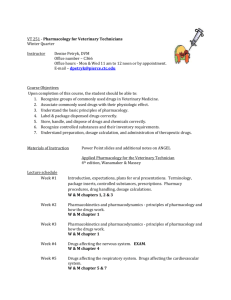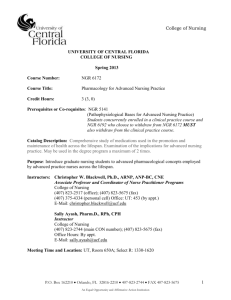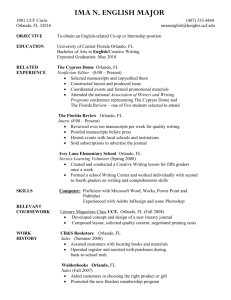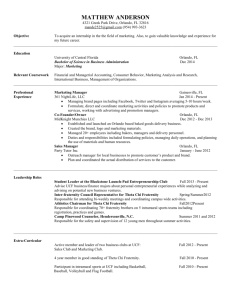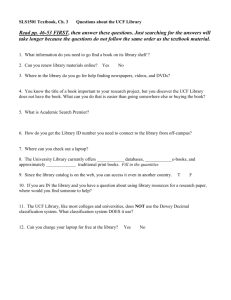College of Nursing
advertisement
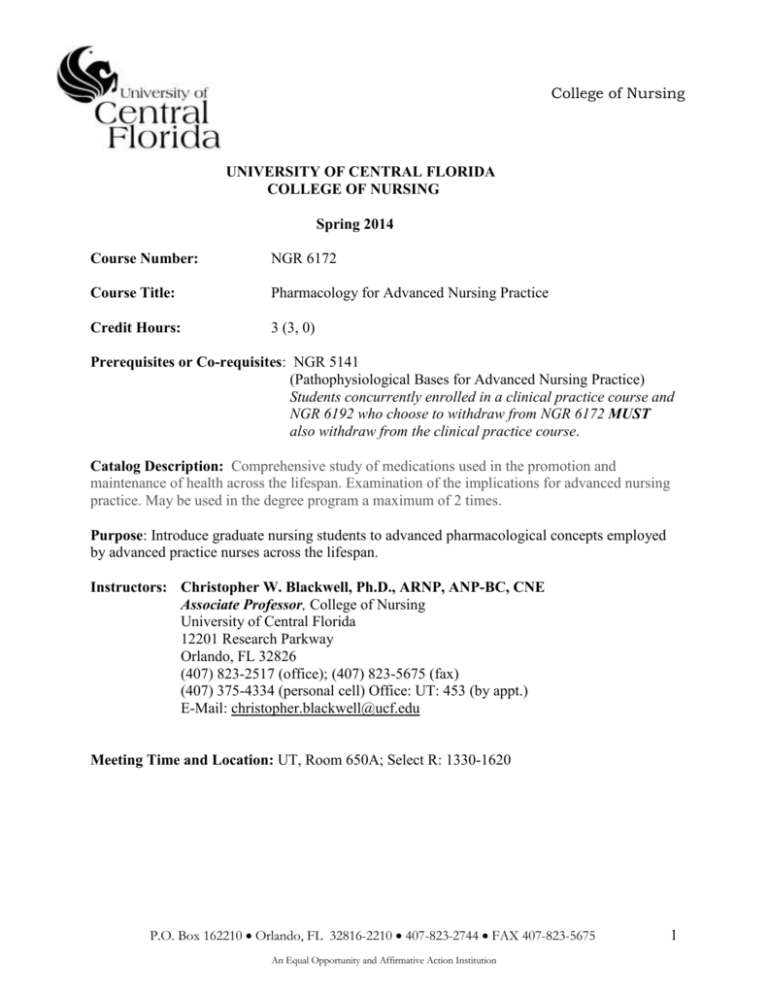
College of Nursing UNIVERSITY OF CENTRAL FLORIDA COLLEGE OF NURSING Spring 2014 Course Number: NGR 6172 Course Title: Pharmacology for Advanced Nursing Practice Credit Hours: 3 (3, 0) Prerequisites or Co-requisites: NGR 5141 (Pathophysiological Bases for Advanced Nursing Practice) Students concurrently enrolled in a clinical practice course and NGR 6192 who choose to withdraw from NGR 6172 MUST also withdraw from the clinical practice course. Catalog Description: Comprehensive study of medications used in the promotion and maintenance of health across the lifespan. Examination of the implications for advanced nursing practice. May be used in the degree program a maximum of 2 times. Purpose: Introduce graduate nursing students to advanced pharmacological concepts employed by advanced practice nurses across the lifespan. Instructors: Christopher W. Blackwell, Ph.D., ARNP, ANP-BC, CNE Associate Professor, College of Nursing University of Central Florida 12201 Research Parkway Orlando, FL 32826 (407) 823-2517 (office); (407) 823-5675 (fax) (407) 375-4334 (personal cell) Office: UT: 453 (by appt.) E-Mail: christopher.blackwell@ucf.edu Meeting Time and Location: UT, Room 650A; Select R: 1330-1620 P.O. Box 162210 Orlando, FL 32816-2210 407-823-2744 FAX 407-823-5675 An Equal Opportunity and Affirmative Action Institution 1 Course Objectives: 1. Integrate the concept of pharmacotherapeutics in the prevention and treatment of illness in clients across the lifespan; 2. Apply nursing and related research in the use of pharmacologic agents; 3. Apply concepts of pharmacokinetics and pharmacodynamics in the selection and monitoring of pharmacologic agents; 4. Discuss the ethical, legal, and professional aspects of advanced nursing practice roles in relation to prescriptive authority and the roles of other health care team members; 5. Use knowledge of drug actions to predict possible adverse reactions, toxic effects, and drug interactions associated with drugs used in the management of common health problems; 6. Relate age, gender, pregnancy status, socioeconomic, psychosocial and cultural considerations to the pharmacologic management of common health problem; 7. Incorporate use of a drug history and client knowledge of drug therapy in developing interventions related to drug therapy. Teaching/Learning Strategies: Lecture Class and Web based discussion Reading Written/ Group Assignments Case Studies Review and use of library and electronic resources Examination EVALUATION METHODS: 3 Proctored Examinations 1 Comprehensive Pharmacokinetics/ Pharmacodynamics Case Study Attendance and Participation Units of Instruction: (Note order of content in lecture will vary slightly. See course schedule)* I. Prescribing Practices, Patient Adherence, and Rational Drug Selection: 1. Florida NP Prescription Laws and Regulations 2. Patient Adherence and Compliance 3. Counterfeit Drug Laws 4. Information Technology and Pharmacotherapeutics; Safety in Pregnancy and Lactation; and additional resources 5. Writing Prescriptions: How, What, and Legally Mandated Components II. Pharmacokinetics and Pharmacodynamics 1. Basic Principles of Pharmacology 2. Adverse Drug Reactions & Interactions 3. Factors that Foster Positive Outcomes 4. Rational Drug Selection P.O. Box 162210 Orlando, FL 32816-2210 407-823-2744 FAX 407-823-5675 An Equal Opportunity and Affirmative Action Institution 2 III. Pharmocogenetics, Pharmacoeconomics, OTCs, Herbals, and Supplements: 1. Cultural and Ethnic Influences in Pharmacotherapeutics 2. Pharmacogenomics 3. Nutrition and Nutraceuticals 4. Pharmacoeconmics 5. OTC Medications 6. Herbal and Complimentary Therapies IV. Drugs Affecting the Hematapoietic System: 1. Anemias 2. Anticoagulants 3. Nutritional Fe+ supplements 3. Growth-Colonization Stimulating Factors (GCSF) V. Drugs Affecting the Endocrine System: 1. Diabetes Mellitus 2. HRT and Osteoporosis 3. Hyperthyroidism and Hypothyroidism 4. Hyperparathyroidism VI. Drugs Affecting the Integumentary System: 1. Dermatological Conditions VII. Drugs Affecting the Neurological System and Drugs Used to Treat Psychiatric Disturbances: 1. Anxiety and Depression 2. Mood Disorders 3. Dementia 4. Psychosis 5. Pain Management: Acute and Chronic 6. Headaches 7. Smoking Cessation 8. ETOH Cessation VIII. Drugs Affecting the Gastrointestinal System: 1. Inflammatory Bowel Diseases 2. Gastric Esophageal Reflux Disease (GERD) 3. Peptic Ulcer Disease (PUD) IX. Drugs Affecting the Respiratory System: 1. Asthma and COPD 2. Pneumonia 3. Tuberculosis 4. Upper Respiratory Infections P.O. Box 162210 Orlando, FL 32816-2210 407-823-2744 FAX 407-823-5675 An Equal Opportunity and Affirmative Action Institution 3 X. Anti-Infectives and Resistance: 1. Drugs Used to Treat Infectious Diseases 2. Basic Principles of Antibiotics 3. Drug Resistance 4. Methicillin-Resistant Staph. aureus 5. Carbapenam resistant Klebsiella XI. Drugs Affecting the Cardiovascular and Renal Systems: 1. Chronic and Acute Stable/ Low-Risk Angina 2. Heart Failure 3. Hyperlipidemia 4. Hypertension XII. Drugs Affecting the Musculoskeletal System: 1. Muscle Relaxants and Anti-Inflammatories 2. Drugs used to treat OA 3. Drugs used to treat RA XIII. Drugs Affecting the Immune System: 1. Corticosteroids 2. Immunomodulators 3. Biologicals 4. HIV/ AIDS XIV. Drugs Affecting the Reproductive System: 1. Contraception and Pregnancy Prevention 2. Sexually-Transmitted Infections 3. Vulvo-Vaginitis 3. Urinary Tract Infections 4. Prostate, Testicular, and Penile Conditions *- Note, this course does not cover the diagnostic process or management of any disease process. Drugs and other medicinal interventions used to treat diseases will be covered and will include classes of drugs and other specific pharmacological interventions used as part of the management of acute and chronic illnesses. Required Text Woo, T. M. & Wynne, A.L. (2011). Pharmacotherapeutics for nurse practitioner prescribers (3rd ed.) Philadelphia, PA: F.A. Davis. Textbook ISBN: 97808362235 Recommended Textbooks: Gilbert, et al. (2012). The Sanford guide to antimicrobial therapy 2012 (42nd Ed.). Sperryville, VA: Antimicrobial Therapy, Inc. Textbook ISBN: 978-1930808706 [also available for mobile devices] P.O. Box 162210 Orlando, FL 32816-2210 407-823-2744 FAX 407-823-5675 An Equal Opportunity and Affirmative Action Institution 4 Recommended Technology: Apple iPhone, iTouch, or Android device with the following Apps downloaded: Monthly Prescriber’s Reference, MedScape, WebMD, Epocrates (all are free) Course Schedule: Date January 9, 2014 (Live) Guest Lecturer: Jonathan Decker, Ph.D., ARNP, FNP-BC January 16, 2014 (WWW) January 23, 2014 (Live) January 30, 2014 (WWW) February 6, 2014 (Live) Content I. Prescribing Practices, Patient Adherence, and Rational Drug Selection: 1. Florida NP Prescription Laws and Regulation 2. Patient Adherence and Compliance 3. Counterfeit Drug Laws 4. Information Technology and Pharmacotherapeutics 5. Writing Prescriptions: How, What, and Legally Mandated Components Assignment Woo & Wynne (2011): II. Pharmacokinetics and Pharmacodynamics 1. Basic Principles of Pharmacology 2. Adverse Drug Reactions 3. Factors that Foster Positive Outcomes 4. Rational Drug Selection II. Pharmacokinetics and Pharmacodynamics 1. Basic Principles of Pharmacology 2. Adverse Drug Reactions 3. Factors that Foster Positive Outcomes 4. Rational Drug Selection Woo & Wynne (2011): II. Pharmacokinetics and Pharmacodynamics 1. Basic Principles of Pharmacology 2. Adverse Drug Reactions 3. Factors that Foster Positive Outcomes Chapters: 1, 4, 11 Chapters: 2, 3, 5, 6 Woo & Wynne (2011): Chapters: 2, 3, 5, 6 Woo & Wynne (2011): Chapters: 2, 3, 5, 6 P.O. Box 162210 Orlando, FL 32816-2210 407-823-2744 FAX 407-823-5675 An Equal Opportunity and Affirmative Action Institution 5 4. Rational Drug Selection February 13, 2014 (WWW) February 20, 2014 (Live) February 27, 2014 (WWW) March 13, 2014 (Live) III. Pharmocogenetics, Pharmacoeconomics, OTCs, Herbals, and Supplements: 1. Cultural and Ethnic Influences in Pharmacotherapeutics 2. Pharmacogenomics 3. Nutrition and Nutraceuticals 4. Pharmacoeconmics 5. OTC Medications 6. Herbal and Complimentary Therapies Woo & Wynne (2011): IV. Drugs Affecting the Hematapoietic System: 1. Anemias 2. Anticoagulants 3. Nutritional Fe+ supplements 4. Growth-Colonization Stimulating Factors (GCSF) V. Drugs Affecting the Endocrine System: 1. Diabetes Mellitus 2. HRT and Osteoporosis 3. Hyperthyroidism and Hypothyroidism Woo & Wynne (2011): VI. Drugs Affecting the Integumentary System: 1. Dermatological Conditions VII. Drugs Affecting the Neurological System and Drugs Used to Treat Psychiatric Disturbances: 1. Anxiety and Depression 2. Dementia 3. Psychosis 2. Pain Management: Acute and Chronic 3. Mood Disorders Chapters: 7, 8, 9, 10, 12, 13 Chapters: 18, 27 Woo & Wynne (2011): Chapters: 21, 33, 38, 41 Exam I: Covers Units I-IV Thursday, February 13, 2014; 1330- 1510 Woo & Wynne (2011): Chapters: 23, 32 Woo & Wynne (2011): Chapters: 14, 15, 29, 35, 43 P.O. Box 162210 Orlando, FL 32816-2210 407-823-2744 FAX 407-823-5675 An Equal Opportunity and Affirmative Action Institution 6 4. Headaches 5. Smoking Cessation 6. ETOH Cessation March 20, 2014 (Live) March 27, 2014 (WWW) April 3, 2014 (WWW) April 10, 2014 (Live) VIII. Drugs Affecting the Gastrointestinal System: 1. Inflammatory Bowel Diseases 2. Gastroesophageal Reflux Disease (GERD) 3. Peptic Ulcer Disease IX. Drugs Affecting the Respiratory System: 1. Asthma and COPD 2. Pneumonia 3. Tuberculosis 4. Upper Respiratory Infections Woo & Wynne (2011): X. Anti-Infectives and Resistance: 1. Drugs Used to Treat Infectious Diseases 2. Basic Principles of Antibiotics 3. Drug Resistance 4. Methicillin-Resistant Staph. Aureus 5. Carbapenan resistant Klebsiella XI. Drugs Affecting the Cardiovascular and Renal Systems: 1. Chronic and Acute Stable/ Low-Risk Angina 2. Heart Failure 3. Hyperlipidemia 4. Hypertension Woo & Wynne (2011): XII. Drugs Affecting the Musculoskeletal System: 1. Muscle Relaxants and Anti-Inflammatories 2. Drugs Used to Treat OA and RA Woo & Wynne (2011): Chapters: 20, 34 Woo & Wynne (2011): Chapters: 17, 30, 42, 45, 46 Chapters: 24, 42, 45, 46 Exam II: Covers Units V-X Thursday, March 27, 2014; 1330- 1530 Woo & Wynne (2011): Chapters: 16, 28, 36, 39, 40 Chapters: 25 P.O. Box 162210 Orlando, FL 32816-2210 407-823-2744 FAX 407-823-5675 An Equal Opportunity and Affirmative Action Institution 7 April 17, 2014 (Live) April 24, 2014 XIII. Drugs Affecting the Immune System: 1. Corticosteroids and Immunomodulators 2. HIV/ AIDS Woo & Wynne (2011): XIV. Drugs Affecting the Reproductive System: 1. Contraception and Pregnancy Prevention 2. Sexually-Transmitted Infections and Vaginitis 3. Urinary Tract Infections 4. Prostate, Testicular and Penile Conditions Exam #3 Woo & Wynne (2011): Chapters: 25, 37 Chapters: 31, 44, 47, 49 Exam III: Covers Units XIXIV Thursday, Apr 24, 2014; 1330- 1510 EVALUATION METHODS Examination #1 40 points Examination #2 60 points Examination #3 40 points Comprehensive Pharmacokinetics and Pharmacodynamics Case Study 50 points Attendance and Participation 10 points ______________________________________________________________________________ Total 200 points Grading System: 96-100 92-95 87-91 83-86 79-82 75-78 70-74 69 or below A AB+ B C+* C* D* F* Points 191 - 200 183 - 190 173 - 182 165 - 172 157 - 164 149 - 156 139 - 148 0 - 138 * - Not acceptable for progression in the Master of Science in Nursing or Doctor of Nursing Practice Programs. P.O. Box 162210 Orlando, FL 32816-2210 407-823-2744 FAX 407-823-5675 An Equal Opportunity and Affirmative Action Institution 8 Academic Progression, Description of Course Assignments, and Course Policies: Academic Progression: An average of 75% must be earned on course examinations to successfully pass this course. Any student with a final course exam average less than 75% will not have any other course assignments (including extra credit, when available) calculated in the final grade and cannot progress in the Doctor of Nursing Practice or Master of Science in Nursing programs in the College of Nursing. Proctored Examination (40, 60, and 40 points): Students will complete 3 examinations (see course schedule) that will be proctored through the ProctorU Examination Proctoring Service. Each exam consists of materials covered in each Unit of the course. And each exam will have 10 questions per Unit covered on the exam (40, 60, and 40 questions respectively for each exam). Students will have 2 minutes per question. The exams are closed note, closed book, closed Internet. NO sources either than the student’s own individual knowledge can be used during the completion of the exams. Comprehensive Pharmacodynamics and Pharmacokinetics Case Study: Students will be placed into groups and will be responsible for completing one comprehensive case study that will provide a detailed discussion of the pharmacodynamics and pharmacokinetics of a particular medication drug class. Each member of the group is graded individually. Therefore, students must demonstrate adequate participation in the assignment. While items in the case study are broad, students are encouraged to contact the instructor for any direction regarding completion of the questions. Grading for the assignment will be based on the following rubric: Item Possible Points Points Earned Answers are complete and comprehensive 10 Answers are applied to a clinical scenario and are clinically 10 appropriate to the primary care setting Responses are provided using most recently available 10 evidence based guidelines Resources provided are recent (Most no more than 5 years 5 old or no more than 10 years old where appropriate) Paper is formatted according to and all cited references meet 10 th APA 6 Edition criteria Evidence of substantial input into the assignment 5* Body of assignment is no more than 5 pages in length, -10 double-spaced using Times New Roman (minus the title and For every 10 reference pages) words over 5 pages * = Students who fail to demonstrate substantial input into the assignment will earn a 0 on the assignment. P.O. Box 162210 Orlando, FL 32816-2210 407-823-2744 FAX 407-823-5675 An Equal Opportunity and Affirmative Action Institution 9 Comprehensive Pharmacodynamics and Pharmacokinetics Case Study Schedule: Unit(s) IV. Drugs Affecting the Hematapoietic System: 1. Anemias 2. Anticoagulants 3. Nutritional Fe+ supplements 4. Growth-Colonization Stimulating Factors (GCSF) V. Drugs Affecting the Endocrine System: 1. Diabetes Mellitus 2. HRT and Osteoporosis 3. Hyperthyroidism and Hypothyroidism VI. Drugs Affecting the Integumentary System: 1. Dermatological Conditions VII. Drugs Affecting the Neurological System and Drugs Used to Treat Psychiatric Disturbances: 1. Anxiety and Depression 2. Dementia 3. Psychosis 2. Pain Management: Acute and Chronic 3. Mood Disorders 4. Headaches 5. Smoking Cessation 6. ETOH Cessation VIII. Drugs Affecting the Gastrointestinal System: 1. Inflammatory Bowel Diseases 2. Gastroesophageal Reflux Disease (GERD) 3. Peptic Ulcer Disease IX. Drugs Affecting the Respiratory System: 1. Asthma and COPD 2. Pneumonia 3. Tuberculosis 4. Upper Respiratory Infections Due Date* 2/5/14 2/19/14 3/12/14 3/19/14 X. Anti-Infectives and Resistance: 1. Drugs Used to Treat Infectious Diseases 2. Basic Principles of Antibiotics 3. Drug Resistance 4. Methicillin-Resistant Staph. Aureus 5. Carbapenan resistant Klebsiella P.O. Box 162210 Orlando, FL 32816-2210 407-823-2744 FAX 407-823-5675 An Equal Opportunity and Affirmative Action Institution 10 XI. Drugs Affecting the Cardiovascular and Renal Systems: 1. Chronic and Acute Stable/ Low-Risk Angina 2. Heart Failure 3. Hyperlipidemia 4. Hypertension XII. Drugs Affecting the Musculoskeletal System: 1. Muscle Relaxants and Anti-Inflammatories 2. Drugs Used to Treat OA and RA XIII. Drugs Affecting the Immune System: 1. Corticosteroids and Immunomodulators 2. HIV/ AIDS 4/9/14 4/16/14 XIV. Drugs Affecting the Reproductive System: 1. Contraception and Pregnancy Prevention 2. Sexually-Transmitted Infections and Vaginitis 3. Urinary Tract Infections 4. Prostate, Testicular and Penile Conditions * = All case studies must be posted to the appropriate discussion board no later than 2355 of the date listed above. Attendance/ Participation (10 points): Students are expected to arrive promptly to class on the 8 days the course is scheduled to meet live (see course schedule, above). In addition, students are expected to remain in class for the entire meeting session (3 hours) and are required to participate in any on-line initiated discussions. Attendance at each session is worth approximately 1.25 points. Students are also expected to arrive to the live class sessions prepared for discussion and are expected to complete any assigned reading assignments before the class meeting. In addition, any additional readings and/or resources posted to the WebCourses site should be read and reviewed prior to the class meetings. Missed Examinations: It is not advisable to miss an examination. The makeup examination and/or assignment may be different than the original exam and could consist of multiple choice, matching, and/or essay style questioning. The instructor(s) can also require additional work such as research assignments, essays, or other work in addition to the examination substitution. Students who do not notify the instructor of a missed assessment within 2 hours of the exam closure time will forfeit makeup and receive a 0 score. All makeup assessments are taken at the instructor’s discretion and are administered live on the Orlando campus. P.O. Box 162210 Orlando, FL 32816-2210 407-823-2744 FAX 407-823-5675 An Equal Opportunity and Affirmative Action Institution 11 Canvas On-Line Learning System How do I access Canvas @ UCF? 1. Go to https://webcourses2c.instructure.com/. You will be forwarded to the Shibboleth login page pictured below. 2. Note: Please DO NOT bookmark the Shibboleth login page shown above. All traffic into Webcourses@UCF must go through https://webcourses2c.instructure.com/. 3. Enter your PID and PID password. 4. Click Continue. ◦ Note: You can bookmark the Webcourses@UCF homepage shown above once you have successfully logged in. 5. Hover over Courses or Courses & Groups at the top of the page. 6. Select the course or group you wish to access. P.O. Box 162210 Orlando, FL 32816-2210 407-823-2744 FAX 407-823-5675 An Equal Opportunity and Affirmative Action Institution 12 Update Your Profile When you first log in, we recommend you update your profile information and your notification preferences. To update your profile settings, take the following steps: 1. Click on your name (or Settings) at the top of the page. 2. Click Edit Settings to make modifications. The default email address associated with your profile is your Knightsmail address. You can add additional email addresses by taking the following steps: 1. Click “Add Email Address” under Ways to Contact. 2. Enter the desired email address. 3. Click Register Email. A window will pop up notifying you that a verification email will be sent to the email address you entered. 4. Click Ok, Thanks. 5. Click the link in that email to finish registering your new email address. Additional Resources • Canvas Tutorial – Review Canvas Student Tutorial at: http://onlinesupport.cdl.ucf.edu/webcourses/instructure-canvas-student-tour/ • Canvas Browser Support – Supported web browser information for Canvas can be found here: http://guides.instructure.com/m/4214/l/41056 • Canvas System Specifications – System recommendations for running Canvas can be found here: http://guides.instructure.com/s/2204/m/4214/l/82542-what-are-the-basic-computerspecifications-for-canvas • Online@UCF Support – Our student helpdesk is prepared to assist you with technical issues encountered in your courses. If you have any questions or problems, please contact onlinesupport@ucf.eduand let them know you have a question about the Canvas Webcourses2@UCF system. There are three ways to contact Online@UCF Support: ◦ Visit http://onlinesupport.cdl.ucf.edu/support/ ◦ call (407) 823-0407 or e-mail onlinesupport@ucf.edu • Canvas Help Centerhas created documentation to assist you in using the new system. ◦ For student guides: http://guides.instructure.com/m/4212 ◦ For instructor guides: http://guides.instructure.com/m/4152 • Videos – Canvas has organized short tutorial videos on how to complete most activities in Webcourses@UCF. These tutorials are typically 5 minutes or less and focus on specific tools in the new environment. Please visit http://guides.instructure.com/m/4210 P.O. Box 162210 Orlando, FL 32816-2210 407-823-2744 FAX 407-823-5675 An Equal Opportunity and Affirmative Action Institution 13 American Nurses Association The Code of Ethics for Nurses 2001 Voted on and accepted by the ANA House of Delegates on June 30, 2001 1. The nurse, in all professional relationships, practices with compassion and respect for the inherent dignity, worth, and uniqueness of every individual, unrestricted by considerations of social or economic status, personal attributes, or the nature of health problems. 2. The nurse's primary commitment is to the patient, whether an individual, family, group, or community. 3. The nurse promotes, advocates for, and strives to protect the health, safety, and rights of the patient. 4. The nurse is responsible and accountable for individual nursing practice and determines the appropriate delegation of tasks consistent with the nurse's obligation to provide optimum patient care. 5. The nurse owes the same duties to self as to others, including the responsibility to preserve integrity and safety, to maintain competence, and to continue personal and professional growth. 6. The nurse participates in establishing, maintaining, and improving health care environments and conditions of employment conducive to the provision of quality health care and consistent with the values of the profession through individual and collective action. 7. The nurse participates in the advancement of the profession through contributions to practice, education, administration, and knowledge development. 8. The nurse collaborates with other health professionals and the public in promoting community, national, and international efforts to meet health needs. 9. The profession of nursing, as represented by associations and their members, is responsible for articulating nursing values, for maintaining the integrity of the profession and its practice, and for shaping social policy. The Code of Ethics for Nurses is available for sale from American Nurses Publishing at 1-800-637-0323 or www.nursesbooks.org P.O. Box 162210 Orlando, FL 32816-2210 407-823-2744 FAX 407-823-5675 An Equal Opportunity and Affirmative Action Institution 14 Office of Student Rights and Responsibilities University of Central Florida YOUR ENROLLMENT STATUS MAY BE AT RISK! Academic Dishonesty in any form will not be tolerated!!! The University of Central Florida has recently started an account with turnitin.com., an automated system which instructors can use to quickly and easily compare each student's report to billions of web sites, as well as an enormous database of student papers that grows with each submission. After submission of the paper, instructors receive a report that states if and how another author's work was used. Violations of student academic behavior standards are outlined in The Golden Rule, the University of Central Florida's Student Handbook. See http://www.ucf.edu/goldenrule/ for further details. 1. Cheating whereby non-permissible written, visual or oral assistance including that obtained from another student is utilized on examinations, course assignments or projects. The unauthorized possession or use of examination or course related material shall also constitute cheating. 2. Plagiarism whereby another's work is deliberately used or appropriated without any indication of the source. Thereby attempting to convey the impression that such work is the student's own. Any student failing to properly credit ideas or materials taken from another has plagiarized. 3. A student who has assisted another in any of the aforementioned breach of standards shall be considered equally culpable. ACADEMIC ACTION * Taken by Instructor, Chair, or Dean of College* 1. Counseling 2. Loss of credit for specific assignment, examination or project. 3. Removal from course with a grade of "F" and/or CONDUCT REVIEW ACTION *Taken by the Office of Student Conduct* 1. Warning 2. Probation 3. Suspension 4. Expulsion 5. Permanent conduct record with UCF accessible by other institutions by request. For more information, please contact the Office of Student Conduct at 823-2851. P.O. Box 162210 Orlando, FL 32816-2210 407-823-2744 FAX 407-823-5675 An Equal Opportunity and Affirmative Action Institution 15 Persons With Disabilities: The University of Central Florida is committed to providing reasonable accommodations for all persons with disabilities. Students who need accommodations must be registered with Student Disability Services (SDS), Student Resource Center Room 132, phone (407) 823-2371, TTY/TDD only phone (407) 823-2116, before requesting accommodations from the professor. Students who are registered with SDS and need accommodations in this course must contact the professor at the beginning of the semester to discuss needed accommodations. No accommodations will be provided until the student has met with the professor to request accommodations. This syllabus is available in alternate formats upon request. P.O. Box 162210 Orlando, FL 32816-2210 407-823-2744 FAX 407-823-5675 An Equal Opportunity and Affirmative Action Institution 16
